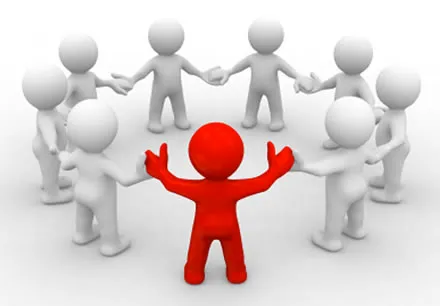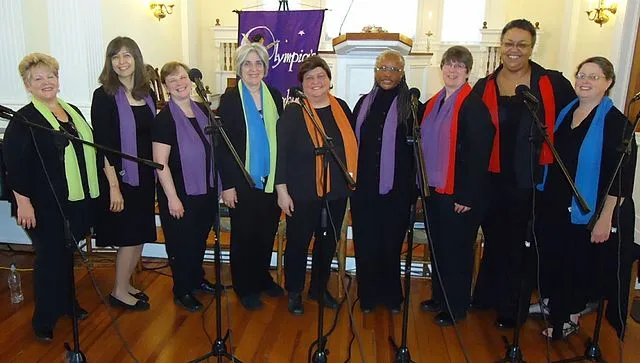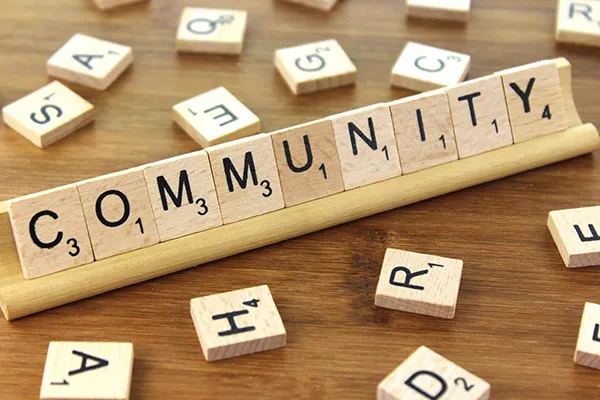Human contact has a powerful effect throughout our lives, especially when we are having problems, be they physical or psychological. I talked about the power of a gentle touch in a recent post, where soft, gentle strokes can make people feel less socially excluded or ostracized.

Source
Human contact isn't just about physical touch. Having human contact by being in the presence of others has an effect on our psychological state. And as can be shown, the psychological state can affect the physiological and physical state. That is, what affects the body can affect the mind, and what affects the mind can affect the body.
A study awaiting peer-review was talked about in the magazine Resurgence & Ecologist. It was about how community can help people with health issues. This was done in a town called Frome, in Somerset, England. It might be too early to conclude that community involvement makes people healthier, because the correlation might not indicate actual causation.
However, the data seems to show that emergency trips to the hospital fall greatly when isolated people with health problems get community and volunteer support in their lives. This 17% drop in Frome for the 3 year study happened while the rest of Somerset experienced a 29% increase in emergency admissions to hospitals.
Frome has become a sociable community with a sense of purpose, thanks in part to the efforts of the Compassionate Frome project that began in 2013. This project sought to build a more compassionate community.
The project recognized that healthcare patients felt their issues were being treated as a cluster of symptoms, instead of seeing a person who had a health problem. The medicalization of patients looks at one symptom and deals with it alone, often treating it with pills.
This is called "silo working" or "silo mentality", where each symptom is looked at isolated in a silo, and treated in a silo where one silo is ignorant of and not communicating with others. This is a form of compartmentalization that works against the health improvement of a patient.

Source
This leaves patients feeling stressed and dejected from a lack of proper solutions to their overall health.
Rather than thinking in silos, connecting things and looking at the body and health to see what is going on as a whole can bring about better solutions. Agencies and community groups were set up in Frome to fill the gaps as "health connectors" to help people plan their care. "Community connectors" were also trained to help people find the support they needed.
Community support can come in many forms. Some people need help to managing their debts or their houses. Other people don't have such issues, but benefit from joining exercise groups, writing workshops, clubs or singing choirs.

Source
Some new research has recently come out about the benefits of singing in groups for mental health patients and the general public. Social engagement is part of singing workshops which helps to generate feeling of connection, belonging and well-being.
Inclusion within a community activity helps to break people out of their isolation that acts as a cycle of misery: illness can reduce socialization, which in turn leads to isolation and loneliness, which can then make the illness worse. Stress and social isolation can increase inflammation. Inflammation can affect our behavior by making us withdraw from social contact. Inclusion and connection with others can reduce stress and isolation, thereby making people healthier.
Our immune system has evolved to listen to our social condition. In the past survival was more harsh, where social isolation increased the risk of predation and sickness. An inflammatory response could be a way to attempt to protect the body in anticipation of a wound or disease. From isolation, to inflammation, to more isolation and even depression.
Social relationships have been studied elsewhere, showing a lower change of death that is comparable to quitting smoking. HIV patients with strong social support have lower level of the virus than those without. Older patients with one or two chronic disease, and high levels of social support, do not have higher death rates that those without chronic diseases.
Social contact seems to be the best kind of prescription a doctor could make to help people with illnesses. If the general public knew about these studies and the effects of social contact, they could take charge of their lives more, and instead of only asking what the doctor is going to do for them, they already know that they are the ones that need to think of what they are going to be doing in their social lives to help themselves.
The power of community can heal.

Source
What do you think? Have your say!
- Will you try to increase your social contact if you get sick or ill as a way to help you heal?
- Have you ever felt ignored by the medical establishment that treats symptoms instead of your whole body health?
- Have you ever experienced the healing aspect of being part of a community, of belonging and feeling connected?
Thank you for your time and attention. Peace.
If you appreciate and value the content, please consider: Upvoting, Sharing or Reblogging below.
 me for more content to come!
me for more content to come!
My goal is to share knowledge, truth and moral understanding in order to help change the world for the better. If you appreciate and value what I do, please consider supporting me as a Steem Witness by voting for me at the bottom of the Witness page; or just click on the upvote button if I am in the top 50.
